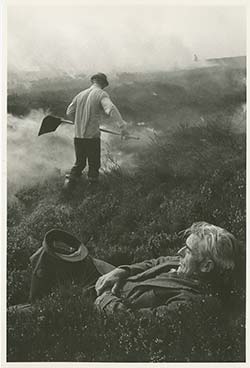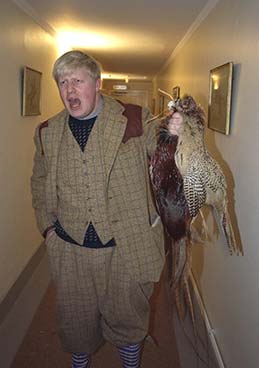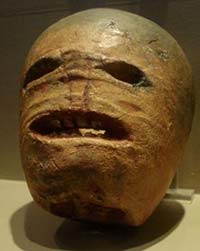
Continuing the second series of the offbeat HebWeb column from local writer and story-teller, George Murphy.
In Episode 17 there's hospital dramas, a Martian postcard, a strange encounter with hippies, a PM with dead pheasants, a mathematical fable, spies and an Android Hospital, Robert Jenrick and memory foam mattresses, good news, bad news and fake news, Jack o'Lanterns and the smells of yesteryear and the perils of rambling.
Murphy’s Lore Series Two
Episode 17: Lockdown diary
Monday, 2 November 2020
Monday, October 19th
New wave theatre
Despite their charts and facts and figures, the sagacious SAGE boffins are forgetting to give us a show. If they want us to follow their advice, we need to see real life dramas. The most compelling theatre is the Emergency one. Take us to the wards, draw back the curtains and let us see the people behind the PPE. Let’s meet patients and their families. Let us root for them and, after welling to tears for those who don’t make it, show us those who pull through and are applauded as they return home. Let us imagine ourselves in these real life Covid dramas. Then we might realise why we should protect our front line workers and vulnerable people, as we did before; and, if necessary, bring the curtain down on our own lives for a short interval.
Tuesday, October 20th
Hospital dramas
In the midday sunshine, the Piece Hall gleamed like an Italian piazza. I’d just got a text from Darling Daughter, a mile away at Calderdale Royal, saying she hadn’t got breast cancer. I beamed over my mask, smiling at every passing stranger, then sat in the sun, waiting to tell her brother, quaffing my coffee, giddy and daft, but harmless as a benign lump.
On BBC News at Six, twin girls, conjoined at their crowns, were wheeled into surgery, eyes alert, smiling and unsuspecting, their small hands wrapped round adult fingers. The surgeon decided the weaker one should get a greater share of blood vessels so that both girls could survive. Six months on, the previously stronger daughter was now the more impaired, head lolling, eyes wandering. The surgeon was haunted by his decision, but the mother had no doubts, kissing his hands and the hands of his team before leaving for the airport with her newly separated daughters.
Red planet
Mars is bigger and brighter just now. I watched for a while to make sure it wasn’t a plane, then brought PW outside and posted a WhatsApp. Which drew neighbours Dave and Vicky outside to take in the spectacle and Jenny in York, Lizzie in London, Dave in Dawley - and Winston just along the canal.
To cap a good day, Marcus Rashford MBE, who apart from campaigning for poor kids not to go hungry, also plays football, scored a late winner in Paris, and I went happily to bed with a new bird.
The Caxton bird
In Craig Raine’s A Martian Sends a Postcard Home, the alien thinks books are many-winged, mechanical birds. He struggles, therefore, to understand humans.
the young are allowed to suffer
openly. Adults go to a punishment roomwith water but nothing to eat.
They lock the door and suffer the noisesAlone. No one is exempt
And everyone’s pain has a different smell.At night, when all the colours die,
They hide in pairsAnd read about themselves-
in colour, with their eyelids shut.
Wednesday, October 21st
Tidying up my electronic diary entries from four years ago, I came across: K plays dolls with Rosie. Rosie is the Dr. or nurse, K is mum and says,“This baby is screaming her head off.”
Rosie, three and a half, who has already spent time in hospitals because of her egg and peanut allergy, replied, “It’s not our job to fix that, that’s your job.”
Later I noted: Tonight I wanted to tell an anecdote from Alan Bennett’s diaries, but I couldn’t remember the word ‘slippers’. Scary. The canal has breached our cellar and a small stream is trickling down below.
Hippy Herbert

A long haired guy in a greatcoat, with a guitar slung to his back and Neal Young patches on his jeans, was leaning against the bridge parapet overlooking the canal. He pulled his mask up to his hairline as I climbed the last step. “Do you know who I hate, man?”
Startled, I shook my head, hoping it wasn’t me.
“Rob-bert Bas-tard Jen-rick!” he enunciated, loudly. I hadn’t expected politics. “How come Jenrick’s telling us how to behave?”
He looked late twenties, early thirties, but he wore a badge proclaiming HERBERT and another with the CND logo, like a time traveller from the seventies, although his politics were up to date.
“First Jenrick broke lockdown rules, yeah? … Then he did a deal with a billionaire pornographer … helped him dodge 40 million in tax and overturn a planning decision. £40 million, man! And imagine how much he’ll make by getting those new houses built?! Then, of course, this billionaire gave 12 grand to the Conservative Party, in gratitude; I mean, come on man?!”
He pulled newspaper cuttings from his pockets and riffled through them, nodded and then smacked them with the back of his hand.
“Then guess what … Jenrick bribed voters in sixty Conservative held seats before the election by giving them money to spend on their town centres.”
A young woman walked up, pale as wet chalk, a stud behind one nostril. She wore bead bracelets. She stood close up to Henry, held his arms, as if to calm him down, focused on his eyes, and said, “We need to go back, yeah?”
“I’m talking to the gentleman.” He half turned towards me. “He also bribed the voters in Newark, his own constituency.”
I said, “Yes. He gave them 25 million. That money was supposed to go to run down places, not Chelsea on Trent!”
He looked at me. “You know about it then?”
I laughed, Robert Jenrick could be my specialist subject on Mastermind.
He said, “Well then, get it out there, man!”
I thought, that’s easy to say, but there’s so much going on. His beautiful girlfriend whispered in his ear. Then they moved off, hand in hand. I watched them go towards the war memorial. He reminded me of the old days, when Hebden hippies thought they’d change the world.
I turned my attention back to the canal and the boats and the day-trippers strolling on the towpath. When I looked back again the couple had vanished, almost as if I’d imagined them.
Bog people


October: the start of heather burning on the moors. There was a pledge from Zach Goldsmith, Minister of State and the Environment, that this government would ban burning on environmental grounds.
With the ennoblement of Ian Botham, another of the prime minister’s friends and a keen grouse shooter, I wonder if this commitment will be quietly dropped?
The season for shooting pheasants lasts from October to February. Tens of millions of pheasants are imported each year to be shot for sport.
Good News
Strange but true: the average age of people dying from Covid-19 deaths is 82, about the same as for the rest of us.
Bad News
According to John Edmunds, an epidemiologist, there will be massive loss of life in the UK this winter because of our failure to contain the virus. “If you look at where we are, there is no way we come out of this wave now without counting our deaths in the tens of thousands.”
Scary maths
So how do you show why the oft said phrase, “The number of virus cases is doubling every (at the moment 9) days,” is so concerning? TV news uses graphs and charts, but when I was teaching in the 70s I remember telling my class an Indian fable. All they had to do for homework was tell it to their parents.
Double jeopardy
Sessa, the mathematician, invented the game of chess. The king was so impressed with his invention that he told Sessa he deserved a reward, and asked him to name his price. Sessa asked the king to grant him one grain of rice on the first square of the board, two on the next, four on the third square, eight on the fourth, and so on, doubling his reward every time. The king was delighted that Sessa had claimed such a modest prize for his new invention and told his treasurer to count the required amount and hand it over to Sessa. It took the treasurer a week to calculate the reward and then he explained that if it was delivered to the mathematician there would be not one grain of rice left for the people in the kingdom. Unable to provide the mathematician with his promised reward, the king was honour bound to abdicate from his throne and Sessa became the new ruler of the kingdom.
I was surprised when at home time a few days later a dad said it had driven him half mad trying to work out his son’s homework! It’s been calculated that if each grain of rice owed to Sessa was strung out into the sky it would stretch to Ursa Minor and back again.
Thursday, October 22nd
Sandworm and Lazarus
According to the FBI and British Intelligence, a team of Russian military intelligence officers, called the Sandworm team, has targeted a host of Western activities in the last decade, including the London Olympics, the police investigation into the Salisbury nerve agent attack and Hillary Clinton’s election campaign in 2016. To spook the spooks the Americans have posted photos of the guilty men.
Sandworm learnt from the tactics and style of their North Korean counterparts, code named The Lazarus Group, so they could mimic them and then throw suspicion on Pyongyang. Lazarus are notorious for planting malware in computers, then demanding ransoms from institutions such as businesses, councils and universities.
I was halfway through writing this monologue when news came that the virus had also been planted in hospital computers around the world.
Android Hospital
Some o t’ lads went to t’ Android Hospital,
It wor set in t’ near future, not far.
There wor Maurice, our John, an’ young Jamie,
An’ they went in a driverless car.Now Maurice had an ingrowing toenail
An’ young Jamie had signed up for t’ snip,
An' our John he wor after a bionic foot
To go wi' his bionic hip.These treatment wor proper expensive,
But they’ve managed to claim t’ money back,
Cos' that night they went down to t’ theatres
Wor t’ night o t’ cyber attack!When Maurice came out of sedation,
His foot wor quite pain free; although,
When he took his surgical sock off
He found he wor minus one toe…An’ our John, who wor one for his dancin’,
A dapper old gent, quite sweet.
Has had to give up on his hobby…
Now he’s literally got two left feet.But I won’t hear a word against androids,
For it’s humans as wants to attack us -
An’ t’ surgeons in t’ Android Hospital
Had their programs hacked into by hackers!But spare a thought for young Jamie,
His treatment’s quite scrambled his head.
He only went in for a vasectomy,
But he got a vagina instead!
Saturday, October 24th
I’ve just finished Calypso by David Serdaris. On a book tour round the States, he took his partner to an Oyster Bar where his parents used to eat. One night the chef came out from the kitchen and announced that Martin Luther King had been assassinated. The diners - apart from his parents - all stood and applauded.
Memory foam
I couldn’t sleep, so I sketched a take on those memory foam mattress cartoons that are doing the rounds. At least I’ll have a lie in before putting the clocks back in the morning.

Monday, October 26th
Good news
An NHS chief has sent an email to his staff telling them that a national vaccination programme is expected to be rolled out before Christmas.
Bad news
The World Health Organisation has announced that global cases reached a new record for the third day in a row.
Fake News

Meanwhile, The Times has exposed Russian troll factories that are hiring western journalists to promote pro-Russian messages. The bribing of these Quislings makes it hard for platforms to take them down because they are ‘legitimate journalists’. In this case, the Russians are promoting their own vaccine by denigrating the Astra Zeneca vaccine being developed in Oxford as ‘a monkey vaccine’.
Thursday, October 29th
Calderdale is moving to tier 3 next week. Apparently it’s ok to drink alcohol in pubs if you also order a meal. Covid hates pub grub.
Friday, October 30th
 On social media, I asked for offcumden and tyke memories of traditional Hallowe’en activities, including Jack o’ Lanterns, which were made by carving faces into swedes, turnips and other obdurate vegetables - followed by putting candles inside. I received over 140 responses. Here’s a sample of my findings:
On social media, I asked for offcumden and tyke memories of traditional Hallowe’en activities, including Jack o’ Lanterns, which were made by carving faces into swedes, turnips and other obdurate vegetables - followed by putting candles inside. I received over 140 responses. Here’s a sample of my findings:
The smells of yesteryear
Sarah Myers remembered “foul smelling turnips” - as did Janet Wheeler, “how disgusting did they smell when you lit the candles.” Helen Banbury remembered, “Swedes carved with scary faces, they smelled horrible, this was in the North East.”
I liked Sue Burger’s note: “swede stank when lit, pumpkins hadn’t been invented then.”
Perhaps tongue in cheek, Bev Speak recalls, “I can still remember the smell … lovely.”
All this triggered an olfactory recollection in Winston Plowes who, unlike Proust (another writer), thought smell the most powerful of the senses for triggering memories.
Regional variations
As to which vegetable ruled where, Amanda Elwen boldly stated, “Turnips all the way on the Cumbrian Scottish border.” To which Rachel Horman added “and East Lancs.” Tamsin Walker agreed it was “turnips in Bradford” in the 80s.
Maura Wilson remembers, “turnips in Glasgow … and they did smell terrible.” Pam Barmby made another confident geographical claim, “Turnips, all down the North East coast from the Borders to Northumberland to County Durham.” Which Joan Cook confirms, “ We had turnips, dad hollowed them out and we put faces on them! In the North East.” Jenny Greenwood responded, “ … yes we did too, up there. We were just talking about this this week.”
Nina Oaken stated, “The turnip lanterns lasted until plot night.”
Perhaps it was a north and south divide. Jayne Benson ‘gouged faces’ out of “Swedes in my homeland of Essex.” Carol Leonard recalls, “Yes, did swede carving in Norfolk.” Sally Baker states, “Swedes in Suffolk. Hard to get one big enough to carve a decent head.” Although Emma Ingham asserted, “Swedes for us mancs.” Phil Champion confirmed, “Same. Swedes in Manchester in 70s and 80s.”
It seems that swedes and turnips dominated, but Sandra Peach wrote of the lanterns made by her husband in his youth, who “came from Buxton, Derbyshire and always referred to them as Mangold Wurzels.” Sandi Green posted: “Was sugar beets in my rural East Anglia home.” and in the deep south too: Frances Powell posted, “We did that in Hampshire in 1960s and 70s.”
Hard work and danger!
Julie Thorpe states it was “harder to carve turnips - never saw a pumpkin.”
Erika Keschner, “I broke my mum’s knife carving a turnip, she was not pleased.’
Lady Wildflower: I remember carving swedes as a kid and it was hell of a lot harder than pumpkins.”
Clare Shaw recalls carving swedes. “It was bloody hard work” … And she ended up “cutting myself and getting blisters.” She strikes a scandi-noir note: “I get very nostalgic at the sight of a blood-smeared swede.”
Lisa Blezard agreed, “Yup, carved a large bit of my finger doing turnip/swede carving.”
Sally Baker, in Suffolk and Debi Waters in the North East remember, “plenty of cuts and bruises.” Heather Fitzpatrick-Morgan: “It took ages, made your wrists ache and ruined a few kitchen implements along the way.”
Good humour wasn’t lacking in the responses. Pat Greenwood made “lanterns with lids to stop the kids falling in and putting the flame out.”
Sadly, perhaps, Johanne Enright and Andy Phipps - born London in 62, never did Hallowe’en night.
Processions and trick and treat
It was still common for a time after the war for children to go on a hallowe’en procession. Adele Midgley Swindells wrote, ‘We used swedes with a candle in, smelt amazing, it was great fun and scary, an adult took us through the woods and we knocked on doors. I don’t remember getting treats, we just did it for fun.”
Nikki Vincent remembers in the 70s and 80s hollowing out swedes, but “there was no door to door … we just used to hang out in my mate’s garage wearing bin bags, great days.”
In The Lore of the Playground, Steve Roud describes ‘Guising’ and this activity was explained by Louise May: “In Scotland we went guising, which was dressing up and knocking on neighbours’ doors and telling a joke/ poem/ song to get sweets. I think they must have emigrated to the USA with Scottish/ Irish immigrants and become trick or treating?”
Kirstie Vincent Hall responded, “Yes we did guising in Scotland. You had a song poem or a wee skit to get your sweetie.”
Further south, Nick Barber takes a proud, traditional and mystical turn: “The stench of burnt mangold wurzel will mek them evil spirits scarce. Pumpkins are piss weak in their defence of paranormal powers. Nothing beats the terror of asymmetric bearded tumpshee. Always a turnip in my house and always will be!”
Some contributors to the discussion thought their trick or treating waited until Mischief Night on November 4 - which I’ll deal with next time, along with penny for the guy, bonfire night and apple bobbing. More messages are raining in as I write this, so I’ll try to include most of them in the next episode.
Saturday, October 31st
The good news
The government is being forced to clamp down on the importation of millions of game birds after legal pressure from Wild Justice, Chris Packham’s campaign group. The government was breaching the law by failing to assess the impact of releasing 50 million birds each year. Two thirds of pheasants and partridges avoid shooting but are subsequently preyed on by foxes, crows and rats, significantly increasing their numbers in wild settings - and foxes and scavengers then prey on endangered species such as lapwings and curlews.
The good bad news
The prime minister has finally responded to scientific advice and England will go into lockdown from next Thursday. No bonfire parties this year then.
Sunday, November 1st
Now at this time of year we would usually have a scary stories night at Shaggy Dog Storytellers sessions in Stubbing Wharf. So here’s one of mine.
Frank’s Ramble
Readers write
Thanks to Stephanie Bowgett for her childhood recollections of German traditions at this time of year, which I will include in the next episode.
Bob Horne recalled that Mischief Night was on 4th November. When asked if he joined in, Bob answered, “Still do!” So he’ll just have time to honour an ancient tradition before the new lock down.
Vivienne Crawford who helped me avoid a misattribution of a poem in the last episode, has written, “Lockdown isn't that bad with the companionship of books & music, but your columns are a way of staying connected to where I actually live, so thank you for those.”
Thanks again for that. Take care folks!
If you would like to send a message about this piece or suggest ideas, email George Murphy
More Murphy's Lore
See the Murphy's Lore home page for all 69 episodes.

